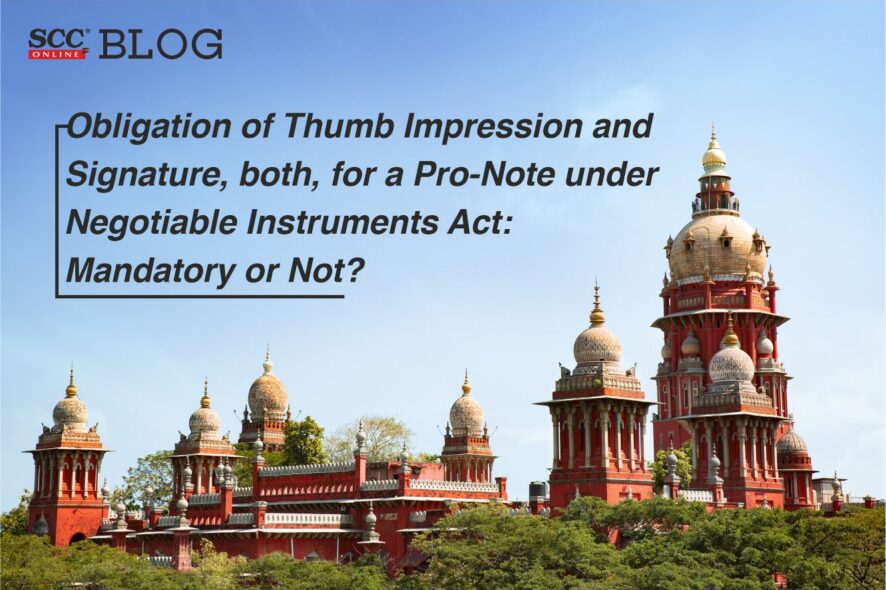Madras High Court: Teekaa Raman, J., observed that there is no mandatory provision under the Negotiable Instruments Act that both the signature and thumb impression has to be obtained for a pro-note and the lower Appellate Judge has totally misguided and misused the provision of the Negotiable Instruments Act, regarding the burden of proof and not even followed basic rudimentary of Section 20 of the Negotiable instruments Act.
Plaintiff filed a suit against the respondent for recovery of money of Rs 1,00,000 each, borrowed by him and executed promissory notes in favour of the plaintiff for consideration.
Resisting the suit, the defendant filed a written statement admitting the execution of the suit promissory notes. However, the defendant raised the plea that the promissory notes had been executed towards security for the loan borrowed and that the loan due was settled by way of execution of a sale deed in the name of the plaintiff’s wife.
Further, it was alleged that the suit promissory notes were not supported by consideration and the blank promissory notes were filled up for the purpose of filing the suit.
Trial Court considered the statutory presumption under Section 118 of the Negotiable Instruments Act and the authority of the holder in due course to fill up the promissory notes under Section 20 of the Act, decreed the suit by the judgment and decree.
First Appellate Authority had erroneously allowed the appeal and observed that the thumb impression of the defendant was not obtained and that the signature in each promissory note was different from each other on comparison by a naked eye. Accordingly, the trial Court’s decision was reversed.
On being aggrieved with the above, the plaintiff approached this, Court.
Analysis, Law and Decision
Questions for Consideration:
- Whether the first Appellate Court erred in law in not considering the scope of Section 118 of the NI Act and the legal presumptions arising under it before dismissing the suit by reversing the well-considered reasonings of the trial Court?
- Whether the first Appellate Court erred in law in rejecting the plaintiff’s right to fill up the suit promissory notes under Section 20 of the Negotiable Instruments Act whereupon the holder is authorized to fill up the blanks and to negotiate the instrument for a certain amount?
- Whether the first Appellate Court is correct in dismissing the suit on the basis of a comparison by naked eye particularly when the defendant has categorically admitted the “execution” and “issuance” in his written statement and in evidence before the Court?
High Court observed that the trial Court had rightly invoked the presumption under the Negotiable Instruments Act and called upon the defendant to rebut the presumption. However, in Court’s opinion, the Appellate Court had not even considered the presumption under the NI Act and not followed even the burden of proof or onus of proof as stated in the Indian Evidence Act.
The Bench stated that once the signature found in the suit documents has been admitted, there is no need or necessity for the plaintiff to give an explanation for not obtaining the thumb impression in the suit promissory note.
Additionally, the High Court noted that it is trite law that in the case of mandatory presumption, the burden of proof on the defendant in such a case would not be as light.
When there is a statutory presumption in favour of the plaintiff, it has to be rebutted by proof and not by a bare explanation. Unless the explanation is supported by proof, the presumption created by the provision cannot be said to be rebutted.
Once statutory presumption is raised, onus of proving absence of consideration is on the executant.
The Bench added that the lower Appellate Court could not understand the facts of the case and had applied wrong preposition of the burden of the proof forgetting the presumption under NI Act and it was the onus of the proof by the defendant to discharge the burden.
Therefore, lower Appellate Court erred in law on rejecting the plaintiff’s right to fill up the suit promissory notes under Section 20 of the NI Act, whereupon the holder is authorized to fill up the blanks and to negotiate the instrument for a certain amount and the “execution” of cheque and “issuance” of cheque in his written statement and in his evidence before the Court, the lower Appellate Court is not right in raising suspicion with regard to the execution merely on the ground that the thumb impression was not obtained.
In view of the above discussion, the second appeal was allowed. [R. Barathbran v. R. Nallathambi, SA Nos. 142 of 2012, decided on 2-3-2022]
Advocates before the Court:
For Appellants: Mr. N. Manokaran
For Respondent: Mr. C. Prakasam






